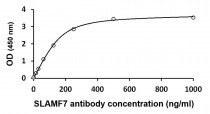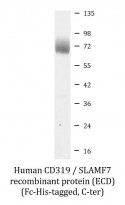ARG70266
Human CD319 / SLAMF7 recombinant protein (ECD) (Fc-His-tagged, C-ter)
Human CD319 / SLAMF7 recombinant protein (ECD) (Fc-His-tagged, C-ter) for Binding Activity,ELISA,SDS-PAGE and Human
Overview
| Product Description | HEK293 expressed, Fc-His-tagged (C-ter) Human CD319 / SLAMF7 recombinant protein (ECD). |
|---|---|
| Tested Reactivity | Hu |
| Tested Application | Binding, ELISA, SDS-PAGE |
| Target Name | CD319 / SLAMF7 (ECD) |
| Species | Human |
| A.A. Sequence | Ser23 - Met226 of Human CD319 / SLAMF7 (NP_067004.3) with an Fc-6X His tag at the C-terminus. |
| Expression System | HEK293 |
| Alternate Names | CD2-like receptor-activating cytotoxic cells; Protein 19A; CS1; Membrane protein FOAP-12; 19A; CD antigen CD319; SLAM family member 7; CD319; CD2 subset 1; Novel Ly9; CRACC |
Application Instructions
| Application Note | Binding activity test: Measured by its binding ability in a functional ELISA. Immobilized Recombinant Human SLAMF7 at 2µg/ml (100 µl/well) can bind Anti-SLAMF7 antibody with a linear range of 60-150 ng/ml. |
|---|
Properties
| Form | Powder |
|---|---|
| Purification Note | 0.22 µm filter sterilized. Endotoxin level is <0.1 EU/µg of the protein, as determined by the LAL test. |
| Purity | >95% (by SDS-PAGE) |
| Buffer | PBS (pH 7.4) |
| Reconstitution | Reconstitute to a concentration of 0.1 - 0.5 mg/ml in sterile distilled water. |
| Storage Instruction | For long term, lyophilized protein should be stored at -20°C or -80°C. After reconstitution, aliquot and store at -20°C for up to one month, at 2-8°C for up to one week. Storage in frost free freezers is not recommended. Avoid repeated freeze/thaw cycles. Suggest spin the vial prior to opening. |
| Note | For laboratory research only, not for drug, diagnostic or other use. |
Bioinformation
| Gene Symbol | SLAMF7 |
|---|---|
| Gene Full Name | SLAM family member 7 |
| Function | Self-ligand receptor of the signaling lymphocytic activation molecule (SLAM) family. SLAM receptors triggered by homo- or heterotypic cell-cell interactions are modulating the activation and differentiation of a wide variety of immune cells and thus are involved in the regulation and interconnection of both innate and adaptive immune response. Activities are controlled by presence or absence of small cytoplasmic adapter proteins, SH2D1A/SAP and/or SH2D1B/EAT-2. Isoform 1 mediates NK cell activation through a SH2D1A-independent extracellular signal-regulated ERK-mediated pathway (PubMed:11698418). Positively regulates NK cell functions by a mechanism dependent on phosphorylated SH2D1B. Downstream signaling implicates PLCG1, PLCG2 and PI3K (PubMed:16339536). In addition to heterotypic NK cells-target cells interactions also homotypic interactions between NK cells may contribute to activation. However, in the absence of SH2D1B, inhibits NK cell function. Acts also inhibitory in T-cells (By similarity). May play a role in lymphocyte adhesion (PubMed:11802771). In LPS-activated monocytes negatively regulates production of proinflammatory cytokines (PubMed:23695528). Isoform 3 does not mediate any NK cell activation. [UniProt] |
| Cellular Localization | Membrane; Single-pass type I membrane protein. [UniProt] |
| Calculated MW | 37 kDa |
Images (2) Click the Picture to Zoom In
-
ARG70266 Human CD319 / SLAMF7 recombinant protein (ECD) (Fc-His-tagged, C-ter) ELISA image
ELISA: The plate was coated with ARG70266 Human CD319 / SLAMF7 recombinant protein (ECD) (Fc-His-tagged, C-ter) at 2 µg/ml (100 µl/well). Samples were detected with serially diluted anti-SLAMF7 antibody.
-
ARG70266 Human CD319 / SLAMF7 recombinant protein (ECD) (Fc-His-tagged, C-ter) SDS-PAGE image
SDS-PAGE analysis of ARG70266 Human CD319 / SLAMF7 recombinant protein (ECD) (Fc-His-tagged, C-ter).







